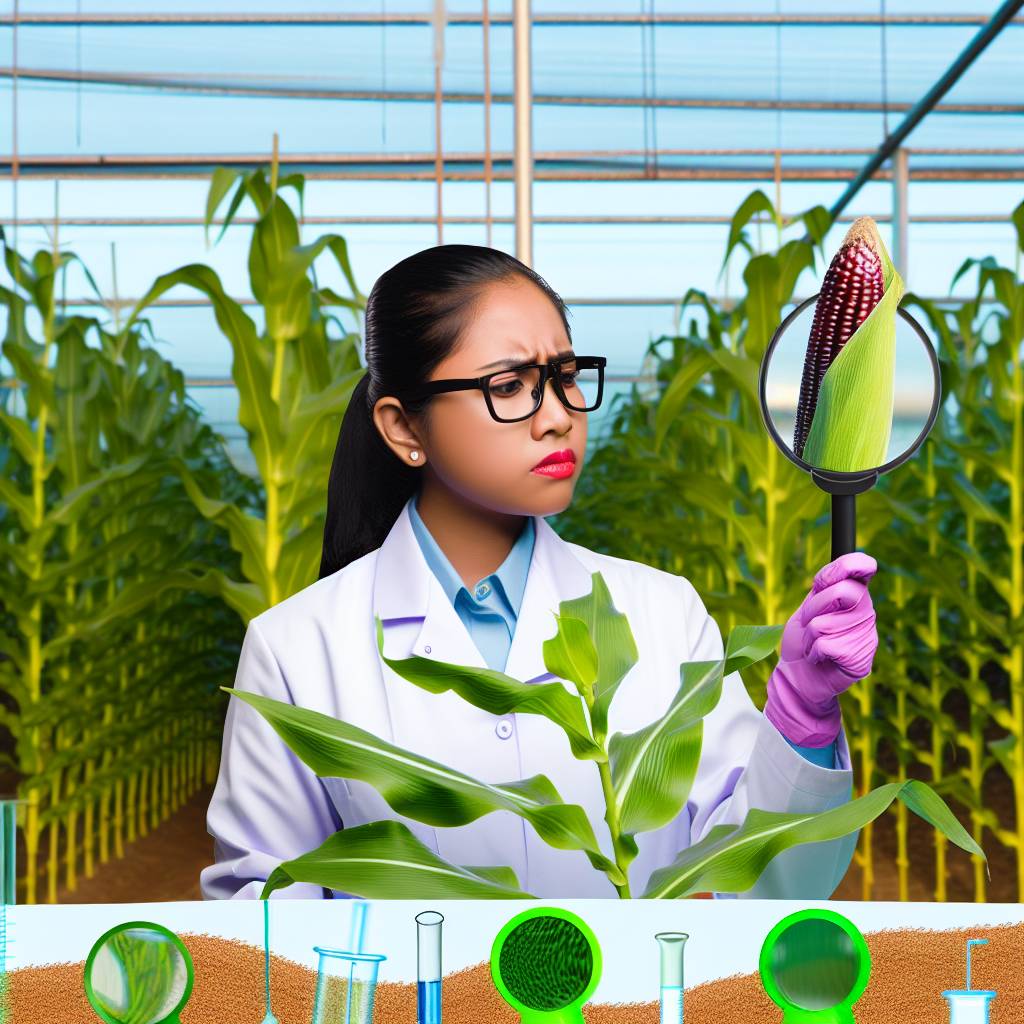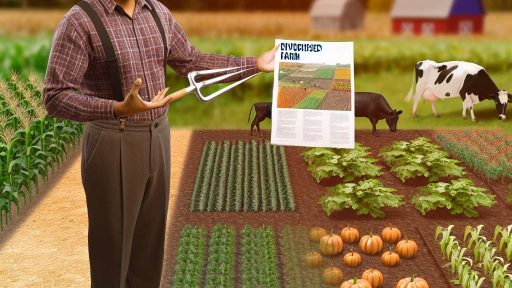Overview of Crop Resilience
Importance of Developing Resilient Varieties
Crop resilience plays a crucial role in modern agriculture.
It refers to a crop’s ability to withstand stressors like drought or pests.
Developing resilient varieties can enhance food security globally.
Thus, farmers can better adapt to climate changes and unpredictable weather.
Adapting to Environmental Changes
Changing climates pose significant challenges for crop production.
Innovative breeding methods help in creating adaptable crop varieties.
These varieties can thrive under various environmental conditions.
Farmers benefit from reduced losses during extreme weather events.
Reducing Dependence on Chemicals
Resilient crops can improve sustainability in agriculture.
These varieties often exhibit natural resistance to pests and diseases.
As a result, farmers can reduce chemical pesticide usage.
This shift leads to healthier ecosystems and reduces pollution.
Boosting Economic Sustainability
Implementing resilient crops can enhance farm profitability.
Farmers can achieve higher yields despite challenging conditions.
This reliability fosters long-term economic stability for agricultural communities.
Transform Your Agribusiness
Unlock your farm's potential with expert advice tailored to your needs. Get actionable steps that drive real results.
Get StartedAdditionally, consumers benefit from a more stable food supply.
Current Challenges in Agriculture: Climate Change, Pests, and Diseases Affecting Crop Production
Impact of Climate Change
Climate change significantly alters agricultural practices.
Rising temperatures threaten crop yields globally.
Shifting weather patterns create unpredictable growing conditions.
Extreme weather events, such as droughts and floods, reduce harvests.
Farmers must adapt to these new realities swiftly.
Innovative farming techniques can help mitigate these challenges.
Pest Infestation and Crop Damage
Pests pose a considerable threat to crop production.
Invasive species can quickly diminish crop yields.
Modern agricultural practices sometimes exacerbate pest proliferation.
Integrated Pest Management offers a sustainable solution.
Adopting natural predators reduces reliance on harmful chemicals.
Farmers are encouraged to embrace eco-friendly pest control methods.
Diseases Affecting Plant Health
Plant diseases affect food security worldwide.
Fungal, bacterial, and viral infections can devastate crops.
Timely detection is crucial for managing these diseases.
Traditional breeding methods often lack the speed needed to respond.
Biotechnology presents new possibilities for resistant varieties.
Research into disease-resistant crops is a growing field of interest.
Overall Economic Impact
These challenges collectively threaten farmers’ livelihoods.
Reduced crop yields lead to economic instability in farming communities.
Moreover, food supply disruptions can lead to increased prices.
Addressing these issues requires collaboration across multiple sectors.
Investing in research and development is critical for long-term solutions.
Showcase Your Farming Business
Publish your professional farming services profile on our blog for a one-time fee of $200 and reach a dedicated audience of farmers and agribusiness owners.
Publish Your ProfileInnovative Breeding Techniques
Exploring Genetic Engineering
Genetic engineering revolutionizes crop breeding methodologies.
This technique enables precise modifications of plant genomes.
Scientists can introduce traits such as pest resistance and drought tolerance.
For example, BioCrop Innovations recently developed a corn variety resilient to dry conditions.
Such advancements have great potential for food security globally.
Understanding CRISPR Technology
CRISPR has emerged as a powerful tool in modern agriculture.
This method allows for targeted genetic modifications.
Scientists can edit genes within specific sites of the plant’s DNA.
Moreover, CRISPR offers a quicker and cheaper alternative to traditional methods.
Many researchers emphasize its ability to enhance crop traits effectively.
Some universities have established CRISPR research teams to explore these possibilities.
Traditional Breeding Methods
Despite technological advancements, traditional breeding remains relevant.
This method relies on cross-pollination to select desired traits.
Farmers and breeders have used this method for centuries.
It promotes the development of varieties that are adaptive to local conditions.
Furthermore, traditional breeding can improve taste and nutritional value.
Local seed banks, like the Heritage Seed Collective, advocate for maintaining these practices.
Combining Techniques for Optimal Results
Integrating these methodologies can optimize crop resilience.
For instance, combining genetic engineering with traditional breeding enhances biodiversity.
This approach strengthens crop adaptability to changing climates.
Researchers continuously explore synergistic possibilities to improve results.
Overall, innovative and traditional techniques together ensure sustainable production.
Delve into the Subject: Sustainable Practices For Lowering Agricultural Expenses
Role of Biotechnological Advances
Understanding Biotechnology’s Impact
Biotechnology significantly transforms agriculture today.
It empowers scientists to develop resilient crop varieties.
These innovations help plants withstand various environmental stresses.
Moreover, biotechnology enhances nutritional content in crops.
Key Techniques in Crop Biotechnology
Genetic modification represents a major breakthrough in agriculture.
This technique allows precise alterations in plant DNA.
Such modifications lead to improved disease resistance.
They also promote tolerance to abiotic stresses, like drought.
Traditional Breeding vs. Biotechnology
Traditional breeding techniques are slow and less precise.
In contrast, biotechnology accelerates crop improvement processes.
It enables the introduction of beneficial traits in one generation.
This efficiency is crucial in responding to climate change challenges.
Success Stories of Biotechnologically Enhanced Crops
Golden Rice exemplifies the success of crop biotechnology.
This variety contains higher levels of Vitamin A.
It aims to combat vitamin deficiency in developing countries.
Similarly, Bt cotton showcases pest resistance via genetic modification.
Future Directions in Crop Biotechnology
The future of crop biotechnology appears promising.
Showcase Your Farming Business
Publish your professional farming services profile on our blog for a one-time fee of $200 and reach a dedicated audience of farmers and agribusiness owners.
Publish Your ProfileAdvancements in CRISPR technology open new possibilities.
Researchers can edit genes with remarkable precision and efficiency.
This approach will drive the next wave of resilient crops.
Learn More: Integrating Farm Activities With Visitor Experiences Effectively
Field Trials and Testing
The Role of Field Trials
Field trials are essential for evaluating the resilience of crop varieties.
They provide critical data on how these varieties perform in real-world conditions.
Through these trials, researchers gain insights into the adaptability of crops.
Moreover, they assess crop performance under different environmental stresses.
Setting Up Field Trials
Establishing field trials requires careful planning and execution.
First, researchers select appropriate trial sites that represent various conditions.
Next, they determine the key variables, such as soil type and climate.
Furthermore, they design experiments to account for these variables effectively.
Data Collection and Analysis
Data collection occurs regularly throughout the growing season.
Researchers monitor growth, yield, and resistance to pests and diseases.
They also assess the impact of environmental factors on crop performance.
Subsequently, they analyze the data to evaluate the success of new varieties.
Impact of Field Trials on Innovation
Field trials drive innovation in crop development significantly.
They provide evidence-based insights for breeders and agronomists.
Ultimately, these trials help identify the most resilient varieties for farmers.
This ensures that agricultural practices can withstand changing climate conditions.
Collaboration and Knowledge Sharing
Collaboration among researchers, farmers, and agricultural institutions is crucial.
Sharing results from field trials enhances collective knowledge.
This practice fosters innovation and the adoption of resilient crop varieties.
As a result, the agricultural community becomes better equipped to face challenges.
Find Out More: Implementing Data-Driven Decisions In Agriculture

Collaboration Between Researchers and Farmers
Importance of Engagement
Engaging farmers in research is crucial for developing resilient crops.
Farmers provide valuable insights from firsthand experience in the field.
Collaboration leads to more applicable and practical solutions.
Creating Effective Partnerships
Establishing partnerships between researchers and farmers fosters innovation.
Regular communication is essential to align research goals with farming needs.
Workshops and meetings can facilitate knowledge exchange between stakeholders.
Incorporating Local Knowledge
Local agricultural practices enrich the research process.
Farmers often have traditional knowledge about environmental conditions.
Integrating this knowledge can enhance crop variety development.
Implementing Feedback Mechanisms
Building feedback loops helps researchers refine their approaches.
Farmers can share their experiences with new crop varieties.
This ongoing dialogue ensures research remains relevant and effective.
Case Studies of Successful Collaboration
Several initiatives demonstrate effective researcher-farmer collaboration.
For instance, the AgroInnovate Project successfully involved local farmers.
This project produced drought-resistant crop varieties through collective efforts.
Showcase Your Farming Business
Publish your professional farming services profile on our blog for a one-time fee of $200 and reach a dedicated audience of farmers and agribusiness owners.
Publish Your ProfileSuch examples illustrate the potential of collaborative approaches in agriculture.
See Related Content: Precision Agriculture Tools Enhancing Farm Productivity
Case Studies of Successful Resilient Crop Varieties
Innovative Rice Varieties in Asia
Researchers have developed resilient rice varieties in the Philippines.
These varieties can withstand typhoons and flooding.
For instance, the “Masagana 99” has shown remarkable adaptability.
Farmers report higher yields even in adverse weather conditions.
This innovation significantly improves food security in the region.
Drought-Tolerant Sorghum in Africa
Drought presents a major challenge for farmers in Africa.
In response, scientists introduced drought-tolerant sorghum.
This variety thrives with minimal water supply.
Farmers in Kenya have embraced this innovation.
As a result, they achieve better harvests despite dry spells.
Pest-Resistant Cotton in India
In India, pest control represents a critical issue for cotton farmers.
The introduction of Bt cotton has transformed production.
This genetically modified variety resists bollworm infestations.
Farmers experience reduced pesticide usage and increased profits.
Moreover, the initiative supports sustainable farming practices.
Heat-Resilient Wheat in Australia
Extreme heat affects wheat production in Australia.
To combat this, researchers have bred heat-resilient wheat.
This variety adjusts better to rising temperatures.
Consequently, farmers can sustain yields even in warmer months.
This innovation offers hope for future wheat production in changing climates.
Adaptive Pulse Crops in Europe
Europe faces challenges related to climate change in agriculture.
Scientists are promoting adaptive pulse crops to address this.
These crops, like lentils and chickpeas, improve soil health.
They also require less nitrogen, offering environmental benefits.
This initiative enhances crop diversity and resilience in European farming systems.
Future Directions: Trends and Predictions for Crop Variety Development in the Face of Global Challenges
Emerging Technologies in Crop Development
Biotechnology plays a crucial role in developing resilient crops.
Innovation in genetic engineering could enhance drought resistance.
Furthermore, CRISPR technology enables precise modifications.
These advancements allow for faster development of new varieties.
Additionally, genomics helps in understanding plant responses to stress.
Climate Change Adaptation Strategies
Climate change demands adaptive strategies in agriculture.
Developers must consider altering temperature and precipitation patterns.
Hence, breeding for heat tolerance becomes essential.
Moreover, crops must withstand increased pest and disease pressures.
Diversifying crop varieties can mitigate these risks.
Sustainable Practices in Crop Variety Development
Integrating sustainability is vital for future agricultural practices.
Conservation agriculture promotes soil health and biodiversity.
This approach reduces reliance on chemical inputs.
Showcase Your Farming Business
Publish your professional farming services profile on our blog for a one-time fee of $200 and reach a dedicated audience of farmers and agribusiness owners.
Publish Your ProfileFurthermore, adopting intercropping can enhance resilience.
Farmers should focus on promoting native crop varieties.
Global Collaboration and Knowledge Sharing
Collaboration between countries fosters knowledge exchange.
International partnerships can facilitate access to resources.
Researchers should share data on plant performance under stress.
Community engagement empowers farmers to adapt methods.
Ultimately, education can enhance agricultural resilience globally.




